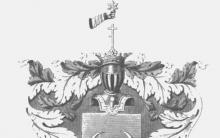This man's talent was truly phenomenal. His knowledge was enormous and multifaceted, he learned many languages, was a good officer, a capable musician, an outstanding diplomat with the makings of a major politician. The comedy "Woe from Wit" put him on a par with the greatest Russian writers. Alexander Sergeevich Griboedov...
He belonged to noble family, got serious home education. Already in early age Griboedov's multifaceted talent was revealed. His two waltzes for piano gained fame in calm, merchant-quiet Moscow. Griboyedov studied at the Moscow University Noble Boarding School, then entered Moscow University. Having graduated from the literature department in 1808 with the title of candidate, he continued to study in the ethical and political department. One of the most educated people of his time, Griboyedov spoke French, English, German, Italian, Greek, Latin languages, later mastered Arabic, Persian, Turkish languages. The widespread version according to which Griboedov graduated from three faculties of Moscow University and only because of the War of 1812 did not receive a doctorate has not yet been confirmed by documents.
With the beginning Patriotic War Griboyedov leaves his academic studies and joins the Moscow Hussar Regiment as a cornet. But he never had the chance to take part in battles: the regiment was in the rear. After the war, the future writer served as an adjutant in Belarus. Griboyedov spent his youth stormy. He called himself and his fellow soldiers, the Begichev brothers, “stepchildren of common sense” - so unbridled were their pranks. There is a known case when Griboedov once sat down at the organ during a service in a Catholic church. At first he played sacred music for a long time and with inspiration, and then suddenly switched to Russian dance music.
Having retired at the beginning of 1816, Griboyedov settled in St. Petersburg and was assigned to serve in the Collegium of Foreign Affairs. Leads a secular lifestyle, moves in theatrical and literary circles in St. Petersburg. He begins to attend Shakhovsky's circle, he himself writes and translates for the theater the comedy "Young Spouses" "His Family, or the Married Bride." The consequence of “ardent passions and powerful circumstances” was drastic changes in his fate - in 1818, Griboyedov was appointed secretary of the Russian diplomatic mission to Persia. On July 16, Count Nesselrode notified in writing the Commander-in-Chief of the Caucasian Army, General Ermolov, that "The official Mazarovich is appointed charge d'affaires of Persia, Griboedov is appointed secretary under him, and Amburger is appointed clerical employee." Nesselrode loved brevity. Not the least role in this kind of exile was played by Griboyedov’s participation in the duel.
Two friends of Griboyedov, revelers Sheremetev and Zavadovsky, competed over the ballerina Istomina. A well-known duelist in the city, the future Decembrist Alexander Yakubovich inflamed the quarrel, and accused Griboedov of ignoble behavior. Sheremetev had to fight with Zavadovsky, Yakubovich - with Griboyedov. Both duels were to take place on the same day. But while they were providing assistance to the mortally wounded Sheremetev, time was running out. The next day, Yakubovich was arrested as the instigator and exiled to the Caucasus. Griboyedov was not punished for the duel, but public opinion found him guilty of Sheremetev's death.
In February 1822, after three years of service in Tabriz, Griboedov transferred to Tiflis to the chief administrator of Georgia, Ermolov. There the postponed duel with Yakubovich took place. Griboyedov was wounded in the arm - for him as a musician it was very sensitive.
It was him who General Ermolov made his secretary “for foreign affairs.” Loving Griboedov like a son, according to Denis Davydov, he tried not to load young man everyday work. And even to high authorities he boldly said that "Poets are the pride of the nation." And in general, he had a fatherly attitude towards smart and courageous youth, not at all embarrassed that the young people working for him, such as, for example, Yakubovich, Kuchelbecker, Kakhovsky, the Raevsky brothers, were considered “unreliable” at that time. Griboyedov, in his own words, stuck to Ermolov “like a shadow.” Secluded, sometimes even at night, they talked - for hours Griboyedov could listen to how the “proconsul of the Caucasus” described Napoleon, the carnivals of Venice, his date with Lady Hamilton.
It was in Tiflis that the 1st and 2nd acts of “Woe from Wit” were written; their first listener was the author’s colleague and close friend Pushkin Wilhelm Kuchelbecker. In the spring of 1823, Griboyedov went on vacation. In Moscow, as well as on the estate of S. Begichev near Tula, where he spends the summer, the 3rd and 4th acts are created immortal comedy. By the autumn of 1824, the comedy was completed. Griboedov travels to St. Petersburg, intending to use his connections in the capital to obtain permission for its publication and theatrical production. However, he soon becomes convinced that comedy “is not to be missed.” Only excerpts published in 1825 by Bulgarin in the almanac “Russian Waist” were censored. The first complete publication in Russia appeared only in 1862; The first production on the professional stage was in 1831. Meanwhile, the comedy immediately became an event in Russian culture, spreading among the reading public in handwritten copies, the number of which was close to the book circulation of that time. The distribution of lists was facilitated by the Decembrists, who viewed comedy as a mouthpiece for their ideas; Already in January 1825, Ivan Pushchin brought “Woe from Wit” to Pushkin at Mikhailovskoe. As Pushkin predicted, many lines of “Woe from Wit” became proverbs and sayings.
In the fall of 1825, Griboedov returned to the Caucasus, but already in February 1826 he again found himself in St. Petersburg - as a suspect in the Decembrist case. There were many reasons for the arrest: during interrogations, four Decembrists, including Trubetskoy and Obolensky, named Griboedov among the members of the secret society, and lists of “Woe from Wit” were found in the papers of many of those arrested. Warned by Ermolov about the impending arrest, Griboyedov managed to destroy part of his archive. This came especially easy for him. He was surprisingly indifferent to the fate of his creations. He could have forgotten the manuscript of “Woe from Wit” at a friend’s place or left it on the piano in some salon. During his many travels, chests of papers disappeared somewhere, and he took care of the piano, which he always carried with him. And even after his death, traces of Griboyedov’s work continued to disappear; all his papers, letters, and things were destroyed in Persia. A fire in the house of his nephew Smirnov, who had been searching for the archives of his famous uncle for many years, completely destroyed all Griboyedov’s papers.
During the investigation, he will categorically deny his involvement in the conspiracy. At the beginning of June, Griboyedov was released from arrest with a “cleaning certificate.” There really was no serious evidence against him, and even now there is no documentary evidence that the writer somehow participated in the activities secret societies. On the contrary, he is credited with a disparaging characterization of the conspiracy: “One hundred warrant officers want to turn Russia over!” But, perhaps, Griboyedov owed such a complete acquittal to the intercession of a relative - General Paskevich, the favorite of Nicholas I.
Upon returning to the Caucasus in the fall of 1826, Griboyedov took part in several battles of the outbreak of the Russian-Persian War. He achieves significant success in the diplomatic field. As Muravyov-Karsky would later write, Griboyedov “replaced an army of twenty thousand with his single face.” He will prepare a Turkmanchay peace that will be beneficial for Russia. Having brought the documents of the peace treaty to St. Petersburg in March 1828, he received awards and a new appointment - minister plenipotentiary to Persia. Instead of literary studies, to which he dreamed of devoting himself, Griboedov is forced to accept a high position.
Griboedov's last departure from the capital in June 1828 was tinged with gloomy forebodings. On his way to Persia, he stops for some time in Tiflis. There he hatches plans for economic transformations in Transcaucasia. In August he marries 16-year-old Nina Chavchavadze. When the young people went out into the street, it seemed that the whole city was welcoming them. In front of them was a continuous sea of flowers; roses flew from all the windows at Nina’s feet. White, red. Two days later there was a dinner for a hundred invited persons, and on September 9 the Griboyedovs mounted their horses. Their huge caravan stretched for a mile. We spent the night under tents in the mountains, breathing the frosty air. In Tabriz, the newlyweds parted: Griboedov was supposed to go to Tehran and transfer his “high appointment” to the Shah of Iran.
Among other matters, the Russian envoy is engaged in sending captive Russian citizens to their homeland. The appeal to him for help by two Armenian women who ended up in the harem of a noble Persian was the reason for reprisals against the active and successful diplomat. On January 30, 1829, a crowd incited by Muslim fanatics destroyed the Russian mission in Tehran. The Russian envoy was killed. Along with him, the entire staff of the Russian mission was destroyed; only the senior secretary Maltsov, an unusually cautious and cunning man, survived. He offered salvation to Griboyedov too, all he had to do was hide. Alexander Sergeevich’s answer was the answer of a man of honor: "A Russian nobleman does not play hide and seek."
Griboyedov was buried in Tiflis on Mount St. David. The whole city mourned him. Residents of Tiflis dressed in black clothes; the balconies were covered with a black veil falling onto the black ground. They held lit torches in their hands. The whole city, like a black cameo, was in darkness and tears. There was complete silence...
The inscription made by Nina Chavchavadze on the grave of Alexander Sergeevich is like a cry from the soul, carved into the stone: “Your mind and deeds are immortal in Russian memory, but why did my love survive you?”
2. Stepan Nikitich Begichev(1785–1859) – colonel, Russian memoirist; brother of D. N. Begichev and E. N. Yablochkova. In 1813 he served as adjutant under General A. S. Kologrivov together with his brother Dmitry and A. S. Griboedov. He was a member of the early Decembrist organizations. Was a member of the Welfare Union. In the 1820s, Begichev's house was one of the centerscultural life Moscow. A. S. Griboyedov, V. F. Odoevsky, V. K. Kuchelbecker, D. V. Davydov, A. N. Verstovsky were here. Based on personal memories, he wrote a “Note about A. S. Griboyedov” (“Russian Bulletin”, 1892). Prince Alexander Alexandrovich Shakhovskoy (1777–1846) - Russian playwright and theatrical figure from the Shakhovsky family. From 1802 to 1826 he served in the St. Petersburg Directorate of Imperial Theaters and actually led the theaters of St. Petersburg. In 1811-1815, Shakhovskoy took an active part in the activities of the “Conversations of Lovers of the Russian Word.” At this time he wrote the poetic comedy “A Lesson for Coquettes, or Lipetsk Waters.” In terms of artistic merit, this play towered above everything that was created in Russia in the field
verse comedy(1784–1833) – poet and translator. Griboyedov wrote a critical article against Gnedich, who sharply criticized Katenin's translation of Burger's ballad "Lenora". Gnedich considered Zhukovsky’s ballad “Lyudmila” to be an exemplary translation of this work. Griboedov noted the inaccuracies of Zhukovsky's translation, which softened the style of the original, and defended Katenin's vernacular translation. Despite this harsh criticism, Griboedov valued Gnedich as a writer and translator. In 1824, having returned to St. Petersburg, he considered it necessary to visit him and in a letter to P. A. Vyazemsky on June 27 he wrote: “I saw Gnedich, despite his tie being tied with an examiner, in thoughts and words and did something pompous, but it seems that he is much smarter than many here" (
Alexander Griboyedov
Alexander Sergeevich Griboyedov (1795-1829) - poet, playwright, pianist, composer, diplomat.
Gifted with many talents and not developing any of them, Griboedov remained for us the author of the only play “Woe from Wit.”
Lifetime portrait of Griboyedov by P.A. Karatygina was published in 1858. More precisely, not the portrait itself, but a lithograph of Munster from a drawing by P.F. Borel. The second reliable portrait of Alexander Sergeevich Griboedov is considered to be a portrait painted with colored pencil in 1824 by the artist M.I. Terebenev (1795-1864). An engraving was made based on it by N.I. Utkina.
 Alexander Griboyedov, 1858 |
 Alexander Griboyedov, 1829 |
 |
Most famous portrait A.S. Griboyedov was written in 1873 by I.N. Kramskoy commissioned by P.M. Tretyakov for his art gallery.
The history of its creation was left to us by a close friend of Kramskoy, the publisher of the magazine “Russian Antiquity” M.I. Semevsky: “Guided by the oral story of P.A. Karatygin about the appearance of Griboyedov, Kramskoy wrote as if “from dictation” and resurrected the appearance of the glorious writer with a talented brush. Wanting to test himself and make sure whether he really managed to catch the similarity, color and facial expression, the artist showed the portrait on the easel to some people who personally knew Griboyedov, and all of them were struck by the amazing similarity and the expression of intelligence and grace that Griboyedov’s features breathed.”
Alexander Griboyedov is a great Russian playwright, poet, musician and state councilor. Few people know that in addition to writing activity, he was also an outstanding diplomat.
In 1808, the young man continued his studies at the same university at the Faculty of Ethics and Politics.
After 2 years, he received a candidate of laws degree and remained in educational institution study natural sciences.
In parallel with this, Griboyedov was interested in music, and even composed compositions. Unfortunately, only 2 waltzes from his musical composition have survived to this day.
Griboedov's entourage
Griboyedov's friends were children from noble families. In addition, he had close relationships with the future, discussing various “forbidden” topics with them. In this regard, he was similar to another great writer -.
Alexander had keen sense humor, and was also an extremely smart, resourceful and cheerful person. Thanks to these qualities, he was the soul of any company.
Griboyedov also loved to talk with people belonging to the intelligentsia. He often spent time with diplomats, poets, artists and musicians.
An interesting fact is that he maintained friendly relations with Griboyedov, considering him one of the most smart people.
At the age of 19, he wrote the comedy “The Young Spouses.” After its production in theaters, the comedy received many positive feedback from ordinary viewers and critics.
After this, Griboedov wrote several more works, and also translated the comedy “Feigned Infidelity” into French.
Duel
One day, Lieutenant Sheremetyev admitted to Griboyedov that the dancer he loved had cheated on him with Count Zavadovsky.

In this regard, Sheremetyev challenged the count to a duel, asking Griboyedov to become his second.
Alexander Sergeevich spent a long time trying to persuade his friend to give up this idea, but he never agreed.
As a result, the duel took place, and the poor lieutenant was mortally wounded in the stomach.
Perhaps the matter would have ended there, but a quarrel occurred between Yakubovich, Zavadsky’s second, and Griboedov, which also led them to a duel.
But since the wounded Sheremetyev had to be urgently taken to the hospital, they decided to postpone the fight.
As a result, the duel took place the following year, 1818. On it, the poet was wounded in the hand.
Political biography
In 1818, the tsarist official Simon Mazarovich invited Griboedov to take the position of secretary of the embassy in Persia, to which he immediately agreed.
Over the course of 3 years of work, Alexander Sergeevich perfectly mastered a new language.
He even began to write poetry in Persian. However, being in a foreign land was a burden for the diplomat, and he constantly dreamed of returning to his homeland.
Possessing a deep mind and high culture, Griboyedov managed to achieve outstanding results in the diplomatic field.
He contributed huge contribution in drawing up the Turkmanchay Treaty, and also played an important role during the Russian-Persian War.
In Tehran, Alexander Griboyedov worked on a peace treaty, the terms of which the Persians did not want to fulfill.
Soon, a fatal event occurred in the diplomat’s biography, leading to a tragic death.
Embassy incident
While engaged in diplomatic affairs, Griboyedov managed to pick up two Armenian women from the harem of Persian Prime Minister Allahyar Khan, whom he planned to send to their homeland.
However, the offended Allayar Khan began to secretly incite the people to unrest. This led to a crowd of religious fanatics beginning to threaten the life of the diplomat.
One more fact should be added here. The fact is that Griboyedov had a servant named Alexander. So that's when former concubines brought to the embassy in order to later send them to , the servant began to pester them.
Women who did not want to leave for their homeland, where poverty awaited them, took advantage of the moment and, jumping out into the street, began shouting that they were being dishonored.
At that same moment, an angry crowd of Persians attacked those who were in the embassy. A bloody massacre began, during which the guards and all the officials and servants were killed.
Death of Griboyedov
When the maddened crowd burst into Griboedov's room, he asked with amazing calm what they wanted. Since the diplomat spoke pure Persian, this confused the raging people.

However, suddenly a stone fell on Alexander Sergeevich’s head, since the rebels had already dismantled the ceiling by that time.
Immediately, several dozen Persians, blinded by anger, attacked the unconscious diplomat, and they began to furiously chop him down with sabers.
Griboedov's corpse was so mutilated that he could only be identified by the scar on his hand, which remained after the duel with Yakubovich.
An interesting fact is that Griboedov had the opportunity to hide from the attack in an Armenian church, but he refused it.
Of all the members of the embassy, only Ivan Maltsev survived, who managed to hide in a chest.
After the tragedy, state mourning was declared in Tehran. Thus, the authorities tried to demonstrate regret about the robbery attack on the Russian embassy.
Then, in order to hush up the crime of his people, the Persian Shah sent Russian Empire grandson with many expensive gifts, including the Shah diamond, decorated with various precious stones.
Alexander Sergeevich Griboyedov was killed on January 30, 1829 at the age of 34. His body was taken to Tiflis and buried on Mount Mtatsminda, in a grotto near the Church of St. David.
A few months later, Alexander Pushkin visited the playwright’s grave.
Personal life
The only wife in Griboyedov’s biography was Nina Chavchavadze, whom he married a year before his death.
At the time of the massacre in Tehran, the girl was 8 months pregnant. In order not to bother her with tragic news, they tried to hide the fact of her husband’s death.
However, Nina’s relatives decided to tell her about it, because they were afraid that she would find out about her husband’s death from strangers.
Having learned about the defeat of the Russian mission and the murder of her husband by a crowd of fanatics, she began to cry quietly. A few days later she went into premature labor, as a result of which the baby did not survive.
 Alexander Griboyedov and his wife - Nina Chavchavadze
Alexander Griboyedov and his wife - Nina Chavchavadze After this, Nina remained alone until the end of her days, forever remaining faithful to her late husband. Soon they began to call her the “black rose of Tiflis.”
At her husband’s grave, Nina Chavchavadze erected a monument with the inscription: “Your mind and deeds are immortal in Russian memory, but why did my love survive you!”
Creativity of Griboyedov
After reading this work, Pushkin said that “half of the poems should become proverbs.” This is what happened in the future.
It is worth noting that the play aroused criticism from the authorities, since it denounced the ruling regime.
 Monument to Griboyedov in Moscow on Chistoprudny Boulevard
Monument to Griboyedov in Moscow on Chistoprudny Boulevard An interesting fact is that the title of this work appears in the song “Red-Yellow Days.”
If you liked Griboyedov’s biography, share it on in social networks. If you generally like biographies of great people, subscribe to the site website. It's always interesting with us!
Did you like the post? Press any button.
Alexander Sergeevich Griboyedov(January 4 (15), 1795 (17950115), Moscow - January 30 (February 11), 1829, Tehran) - Russian nobleman, playwright, poet and diplomat, composer (two “Griboedov Waltzes” have survived), pianist. State Councilor (1828).
Griboyedov is known as homo unius libri - the writer of one book, the brilliantly rhymed play "Woe from Wit", which is still one of the most popular theatrical productions in Russia, as well as the source of numerous catchphrases.
Biography
Born in Moscow in the family of a guards officer. Received a comprehensive home education. From 1802 (or 1803) to 1805 he studied at the Moscow University Noble Boarding School (the same place where Lermontov would study in his time). In 1806 he entered Moscow University at the Faculty of Philosophy. In 1810, having graduated from the literature and law departments, he continued to study at the Faculty of Physics and Mathematics. At the university, Griboyedov stood out for his versatile talents, extraordinary musical abilities(Alexander played the piano superbly); mastered French, German, English and Italian languages. Griboedov's mentors were Petrosilius, Doctor of Laws Ion, and finally Professor Bule. Scientific interests Griboyedov kept it for the rest of his life. In 1812, Griboyedov volunteered for the army; the cavalry units in which he was a member were in reserve. In 1814 A.S. Griboyedov published correspondence “On cavalry reserves”, “Letter from Brest-Litovsk to the publisher” in the journal “Bulletin of Europe”. In 1815, Griboyedov’s comedy “The Young Spouses” was published and staged - a reworking of the comedy by the French playwright Creuset de Lesser “La secret du menage”, which caused criticism from M.N. Zagoskina. Griboyedov responded with a pamphlet: “ Lubochny Theater" In 1816, after retiring, Griboyedov settled in St. Petersburg. In 1817, he enlisted in the College of Foreign Affairs and met writers - V.K. Kuchelbecker, N.I. Grech, and somewhat later with the genius of Russian literature A.S. Pushkin.
At first literary activity Griboyedov collaborates with P. A. Katenin, A. A. Shakhovsky, N. I. Khmelnitsky, A. A. Zhandre. In 1817, the comedy “Student” was written (together with Katenin), directed against the poets of “Arzamas”, followers of N. M. Karamzin. Making fun of them, Griboyedov polemicized both with the sensitivity of sentimentalism and with the dreaminess of romanticism in the spirit of V. A. Zhukovsky. Sharing the literary views of I. A. Krylov and G. R. Derzhavin, Katenin and Kuchelbecker, Griboedov was close to the group of so-called “archaists” who were members of the “Conversation of Lovers of the Russian Word” society, headed by A. S. Shishkov. These views were reflected in Griboedov’s article “On the analysis of the free translation of the Burger’s ballad “Leonora”,” in which he defended the translation made by Katenin from the criticism of N. I. Gnedich. The comedy “One’s Own Family, or The Married Bride” was written in 1817 mainly by Shakhovsky, but with the help of A.S. Griboyedov (who wrote the beginning of the second act) and Khmelnitsky. The comedy “Feigned Infidelity”, which is a free translation (written together with Gendre) of the comedy of the French playwright Barthes “Les fausses infidelites”, was presented on the stages of St. Petersburg and Moscow in 1818, and in Orel in 1820.
In mid-1818, Alexander Sergeevich Griboyedov was appointed secretary of the Russian diplomatic mission in Persia. This appointment was essentially an exile, the reason for which was Griboedov’s participation as a second in the duel between officer V.A. Sheremetev and gr. A.P. Zavadovsky because of the artist Istomina. In February 1819 A.S. Griboyedov arrived in Tabriz. Probably, an excerpt from his poem “Traveler” (or “Wanderer”) - “Kalyanchi” - about a captive Georgian boy who is sold at the Tabriz market, dates back to this time. Since 1822 A.S. Griboedov is on the staff of the Chief Administrator of Georgia, General A.P. Ermolov “on the diplomatic side” in Tiflis. The first two acts of the comedy “Woe from Wit,” conceived, according to S. N. Begichev, back in 1816, were written here. In 1823-25 A.S. Griboyedov was in long vacation. In the summer of 1823, on the Tula estate of his friend Begichev, he wrote the third and fourth acts of the comedy “Woe from Wit.” In the autumn of the same year, together with P. A. Vyazemsky, he wrote the vaudeville “Who is Brother, Who is Sister, or Deception after Deception,” the music for which was composed by A. N. Verstovsky. In the summer of 1824, Griboyedov completed the final revision of the comedy “Woe from Wit.”
At the end of 1825 A.S. Griboyedov returned to the Caucasus. Alexander Sergeevich had ideas for new works, which, unfortunately, have reached us only in fragments. The outline of the drama “1812” (1824-25) indicates that Griboyedov intended to portray the heroes of the Patriotic War, among whom was a serf peasant who experienced a sense of high patriotism in battles; returned at the end of the war “under the stick of his master,” he commits suicide. Came down to us in a fragment and in a retelling by F.V. Bulgarin's tragedy “Georgian Night” (1826-27), based on Georgian legend, is imbued with anti-serfdom thought. Plan of tragedy from history Ancient Armenia and Georgia “Rodamist and Zenobia” shows that A.S. Griboyedov paid, on the one hand, tribute to his inclination to historical research, and on the other hand, to the political problems of the present, transferred to a distant era; he was thinking about royal power, the failure of a conspiracy of nobles who did not rely on the people, about the role of the people, etc.
From January 22 to June 2, 1826 A.S. Griboyedov was under investigation in the Decembrist case. However, no charges were brought against him. Moreover, it turned out that long before the Decembrist putsch A.S. Griboyedov left the Masonic lodge, refusing any cooperation with them. After returning to the Caucasus in September 1826, A.S. Griboyedov is already acting as a statesman and an outstanding diplomat. In 1827, Griboyedov was ordered to be responsible for diplomatic relations with Persia and Turkey. Alexander Griboyedov takes part in issues of civil governance in the Caucasus, draws up the “Regulations on the governance of Azerbaijan”; with his participation, the Tiflis Gazette was founded in 1828, and a “workhouse” was opened for women serving sentences. A.S. Griboyedov, together with P. D. Zaveleisky, draws up a project on the “Establishment of the Russian Transcaucasian Company” in order to boost the industry of the region. In 1828, Griboedov took part in the Turkmanchin Peace Treaty concluded with Persia. He is then appointed Minister Plenipotentiary to Persia. Alexander Sergeevich Griboyedov viewed this not as “royal mercy,” but as “political exile,” as a “cup of suffering” that he had to drink. In August 1828, in Tiflis, before leaving for Persia, Griboedov married N.A. Chavchavadze. Leaving his wife in Tabriz, he went with the embassy to Tehran. Here he became a victim of a conspiracy led by Fet-Ali Shah and his dignitaries, bribed by England, which was afraid of the growing influence of Russia in Persia after the Russian-Persian War of 1826 - 1828. During the extermination of the Russian embassy in Tehran, Alexander Sergeevich Griboedov was killed by a crowd of Persian fanatics, the embassy fought to the last with the angry, uneducated crowd. Griboyedov was advised to hide in a chimney, but he was discovered and killed. The brutal crowd continued to mutilate the body of the now deceased Griboyedov. His body was transported to Tiflis and buried on Mount St. David. So Russia lost a great literary figure. There were still the deaths of Pushkin and Lermontov ahead.
A.S. Griboyedov entered the ranks of great Russian and world playwrights as the author of the comedy “Woe from Wit.” Rejected by censorship (during Griboyedov’s lifetime, excerpts were published in the anthology “Russian Waist”, 1825), the comedy was distributed in numerous lists.
Works by A. S. Griboyedov
Griboedov's dramaturgy:
- 1812 (plan and scene from drama) (year unknown)
- Woe from Wit (comedy in four acts in verse) (1824)
- Georgian Night (excerpts from the tragedy) (1826 or 1827)
- Dialogue of Polovtsian husbands (excerpt) (not earlier than 1825)
- Who is brother, who is sister, or deception after deception (new vaudeville opera in 1 act) (1823)
- The Young Spouses (comedy in one act, in verse) (1814)
- Feigned Infidelity (a comedy in one act in verse) (1818)
- Sample interlude (interlude in one act) (1818)
- Rodamist and Zenobia (tragedy plan) (year unknown)
- <"Своя семья, или замужняя невеста">(excerpt from a comedy) (1817)
- Serchak and Itlyar (1825)
- Student (comedy in three acts, written together with P. A. Katenin) (1817)
- Youth of the Prophet (sketch) (1823)
Publicism by Griboyedov:
- <Заметка по поводу комедии "Горе от ума"> (1824-1825)
- On cavalry reserves (1814)
- On the analysis of the free translation of the Burger ballad “Lenora” (1816)
- My uncle's character
- Special cases of the St. Petersburg flood (1824)
Travel notes of Griboyedov:
- Mozdok - Tiflis
- Tiflis - Tehran
- Tehran - Sultaneya
- Vagina's story
- Miana - Tabriz - Gargari
- Ananur quarantine
- Tiflis - Tabriz
- Single notes
- Erivan campaign
Works attributed to Griboyedov:
- Country Trip (1826)
Poems by A. S. Griboyedov
- From Apollo (1815)
- Lubochny Theater (1817)
- <Эпитафии доктору Кастальди> (1820)
- <Н. А. Каховскому> (1820)
- David
- Romance (1824)
- "Fluttering with wings, ringing with arrows..." (1824)
- Epigram (1824)
- "How do magazine brawls settle down" (1824?)
- Excerpt from Goethe (1824)
- Teleshova (1824)
- Predators on Chegem (1825)
- "- According to the spirit of the times and taste..." (1826)
- Liberated (1826)
- A. O[doevsky]
- Sorry, Fatherland!
- "Where Alazan winds..."
- Kalyanchi
- Brownie
Poems attributed to Griboyedov
- Important Acquisition (1825)
- East
- Ode to Duels (1819)
Memory
- In Moscow there is an institute named after A. S. Griboyedov - IMPE named after. Griboyedova
- Was released in 1995 Postage Stamp Armenia, dedicated to Griboyedov
- In Tbilisi there is a theater named after A. S. Griboedov, a monument (author M. K. Merabishvili)
- There are Griboyedov streets in Bryansk, Yekaterinburg, Ryazan, Irkutsk and a number of other cities and settlements in Russia, Yerevan, Minsk, Simferopol, Tbilisi.
- Griboyedov Canal (until 1923 - Ekaterininsky Canal) - a canal in St. Petersburg
- When Griboyedov finished work on the comedy “Woe from Wit,” the first person he went to show his work was the one whom he feared most, namely the fabulist Ivan Andreevich Krylov. With trepidation, Griboyedov went to him first to show off his work.
“I brought the manuscript! Comedy..." "Commendable. So what? Leave it." “I will read my comedy to you. If you ask me to leave from the first scenes, I will disappear.” “If you please, start right away,” the fabulist agreed grumpily. An hour passes, then another - Krylov sits on the sofa, hanging his head on his chest. When Griboyedov put down the manuscript and looked questioningly at the old man from under his glasses, he was struck by the change that had occurred in the listener’s face. Radiant young eyes shone, the toothless mouth smiled. He held a silk handkerchief in his hand, preparing to apply it to his eyes. “No,” he shook his heavy head. - The censors won't let this pass. They make fun of my fables. And this is much worse! In our time, the empress would have sent this play along the first route to Siberia.” So much for Griboyedov.











Patriarch Nikon. Short biography. Patriarch of Moscow and All Rus'. Nikon Church Nikon
What is consolidated reporting?
Statutory audit - grounds for conducting an audit
What can you cook from chicken?
How to fry pasta in a frying pan